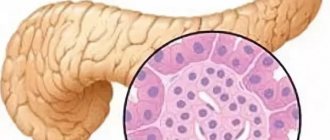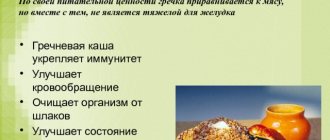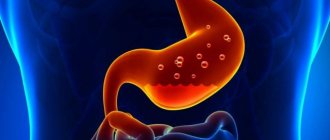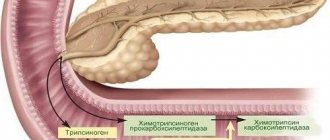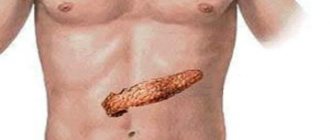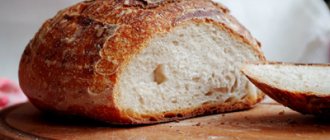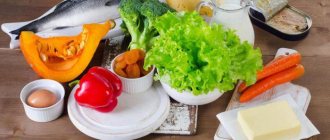General rules
The pancreas is an important organ of the digestive system as it is responsible for producing digestive enzymes and the hormone insulin , which controls blood sugar levels. Pancreatic cancer is a serious disease with a poor prognosis.
Oncological disease negatively affects the functioning of the organ, and treatment is complicated by the inability to diagnose it in the early stages. In this case, rapid metastasis is observed. The results of surgical treatment (even after radical resection of the R0 tumor) leave much to be desired. First of all, only 10-20% of cases have a resectable tumor. Low resectability is explained by the high incidence of locally advanced disease or metastasis, as well as the technical difficulties of the operation itself. Therefore, surgical intervention alone does not provide good results, and its addition with chemoradiotherapy improves the survival of patients.
After treatment, therapeutic nutrition plays a special role. It is aimed at suppressing hyperenzymeemia, reducing the load on the digestive tract as a whole, improving metabolic processes in the pancreas and restoring its function (as far as possible).
Proper nutrition for pancreatic cancer allows you to:
- stabilize the patient’s well-being;
- slightly reduce the manifestations of the disease;
- prevent weight loss;
- normalize blood sugar levels.
Main characteristics of the diet
- Food should be easily digestible.
- Dishes are only boiled and steamed. The degree of grinding depends on the patient’s condition, so it can be liquid, puree, pureed or thoroughly crushed.
- Fat content is extremely limited or eliminated. In stage 4 cancer, fat is not digested, causing diarrhea .
- Avoid foods with a strong smell and taste (sour, spicy, salty). Food should be neutral, as strong odors can cause nausea and provoke vomiting. If you feel the urge to vomit, stop eating.
- Emphasis on the consumption of protein dishes (cottage cheese, cheese, lean fish, fermented milk products, eggs, dietary meat).
- Eating two servings of vegetables and two servings of fruit daily. Most often they are subjected to heat treatment, since in their raw form they can cause discomfort, bloating and worsen the patient’s condition.
- Do not overload the stomach and digestive system - split meals (5 times a day) in small portions are recommended. On the other hand, you should not eat food forcefully, trying to adhere to the regime. In the absence of appetite, it may change. In some cases, medications that improve appetite are prescribed.
- On the recommendation of a doctor, it is possible to take enzymes to improve food digestion.
- Replacement therapy is justified in this case, since pancreatic function is affected.
- Maintaining an adequate drinking regime (herbal teas, diluted juices without sugar, decoctions of dried fruits, filtered water).
- Limit the amount of salt (6-8 g).
- Avoiding refined sugar.
- Exclusion of extractives and coarse fiber. To further extract substances from meat, cook it in small pieces, draining the water several times after 10 minutes. Ready meat is used for further preparation (puddings, soufflés, minced meat).
When metastasis occurs, the target becomes the liver, gall bladder or stomach; this certainly worsens the patient’s condition and requires an even more careful attitude to one’s diet. It is especially important for liver damage, which reduces its detoxification function and is unable to neutralize carcinogenic substances (nitrates, GMOs, food coloring, additives and stabilizers). The food should be natural, and in order to reduce the nitrate content, soak vegetables and fruits and remove the peels.
Nutrition for pancreatic cancer
Pancreatic cancer from the onset of the disease manifests itself as digestive disorders. Patients require a special diet. The cooks at the Yusupov Hospital prepare dishes that correspond to dietary table No. 5 according to Pevzner. Doctors take an individual approach to choosing a treatment method for each patient. Diet is an important component of the treatment program.
Professors and doctors of the highest category choose tactics for managing patients suffering from pancreatic cancer at a meeting of the Expert Council. Oncologist surgeons masterfully perform the most complex surgical interventions. Medical staff provides care for patients in the postoperative period. After the operation, special nutrition is prescribed.
Authorized Products
Diet for pancreatic cancer includes:
- Soups made with vegetable broths. You can make puree soups. Cereals (semolina, rice, rolled oats) and pureed boiled vegetables are added to soups. Vegetables for soups cannot be fried.
- Lean veal, beef, chicken, rabbit, boiled and steamed turkey. Only chopped products are recommended (meatballs, cutlets, souffles, dumplings, meatballs). You can add boiled pureed vegetables to minced meat - this will add juiciness and taste to the minced meat. Souffles and purees are also prepared from the boiled pulp of the bird.
- Low-fat fish (cod, pike, pike perch, hake, pollock, carp, perch, whiting) boiled or steamed, soft fish can be eaten in pieces, disassembled into fibers. Poached fish is not allowed, as it contains more extractive substances than boiled fish.
- Boiled and grated vegetables: potatoes, pumpkin, zucchini, carrots, cauliflower, green peas, beets. If tolerance is poor, the list of vegetables is reduced. White cabbage and legumes are limited or excluded due to the possibility of causing gas formation.
- Cereals: buckwheat, rice, semolina and oatmeal. Boil it in water and grind it to a viscous consistency. Using buckwheat and rice flour speeds up cooking.
- Wheat bread that is stale or dried out, unhealthy biscuits (biscuits).
- Low-fat dairy products, cottage cheese in its natural form, as part of puddings, casseroles, soufflés. If you have a calcium deficiency, you can prepare calcined cottage cheese. Whole milk usually causes bloating and diarrhea, so it is carefully introduced into the diet in the form of additives to omelets and cereals.
- Protein omelettes. You can have 1 soft-boiled egg per day.
- Baked sweet apples, jelly and jelly made from fruits and berries. You can try introducing raw pureed fruits and berries.
- Butter in dishes (10-15 g per day).
- Fruit juices diluted with water, weak tea with lemon, rosehip infusion, still table water, compotes (from fresh and dried fruits).
Table of permitted products
| Proteins, g | Fats, g | Carbohydrates, g | Calories, kcal | |
Vegetables and greens | ||||
| zucchini | 0,6 | 0,3 | 4,6 | 24 |
| broccoli | 3,0 | 0,4 | 5,2 | 28 |
| cauliflower | 2,5 | 0,3 | 5,4 | 30 |
| potato | 2,0 | 0,4 | 18,1 | 80 |
| carrot | 1,3 | 0,1 | 6,9 | 32 |
| cucumbers | 0,8 | 0,1 | 2,8 | 15 |
| tomatoes | 0,6 | 0,2 | 4,2 | 20 |
| pumpkin | 1,3 | 0,3 | 7,7 | 28 |
Fruits | ||||
| apples | 0,4 | 0,4 | 9,8 | 47 |
Nuts and dried fruits | ||||
| dried apricots | 5,2 | 0,3 | 51,0 | 215 |
| dried apricots | 5,0 | 0,4 | 50,6 | 213 |
| prunes | 2,3 | 0,7 | 57,5 | 231 |
Cereals and porridges | ||||
| buckwheat (kernel) | 12,6 | 3,3 | 62,1 | 313 |
| semolina | 10,3 | 1,0 | 73,3 | 328 |
| oat groats | 12,3 | 6,1 | 59,5 | 342 |
| rice | 6,7 | 0,7 | 78,9 | 344 |
Bakery products | ||||
| wheat bread | 8,1 | 1,0 | 48,8 | 242 |
Confectionery | ||||
| jelly | 2,7 | 0,0 | 17,9 | 79 |
| Maria cookies | 8,7 | 8,8 | 70,9 | 400 |
Raw materials and seasonings | ||||
| honey | 0,8 | 0,0 | 81,5 | 329 |
Dairy | ||||
| kefir 1.5% | 3,3 | 1,5 | 3,6 | 41 |
| curdled milk 1% | 3,0 | 1,0 | 4,1 | 40 |
| acidophilus 1% | 3,0 | 1,0 | 4,0 | 40 |
Cheeses and cottage cheese | ||||
| cottage cheese 1% | 16,3 | 1,0 | 1,3 | 79 |
| cottage cheese 1.8% (low-fat) | 18,0 | 1,8 | 3,3 | 101 |
Meat products | ||||
| beef | 18,9 | 19,4 | 0,0 | 187 |
| rabbit | 21,0 | 8,0 | 0,0 | 156 |
Bird | ||||
| boiled chicken breast | 29,8 | 1,8 | 0,5 | 137 |
| boiled turkey fillet | 25,0 | 1,0 | — | 130 |
Eggs | ||||
| chicken eggs | 12,7 | 10,9 | 0,7 | 157 |
Fish and seafood | ||||
| flounder | 16,5 | 1,8 | 0,0 | 83 |
| pollock | 15,9 | 0,9 | 0,0 | 72 |
| blue whiting | 16,1 | 0,9 | — | 72 |
| cod | 17,7 | 0,7 | — | 78 |
| hake | 16,6 | 2,2 | 0,0 | 86 |
| pike | 18,4 | 0,8 | — | 82 |
Oils and fats | ||||
| butter | 0,5 | 82,5 | 0,8 | 748 |
| sunflower oil | 0,0 | 99,9 | 0,0 | 899 |
Non-alcoholic drinks | ||||
| water | 0,0 | 0,0 | 0,0 | — |
| mineral water | 0,0 | 0,0 | 0,0 | — |
Juices and compotes | ||||
| apricot juice | 0,9 | 0,1 | 9,0 | 38 |
| carrot juice | 1,1 | 0,1 | 6,4 | 28 |
| peach juice | 0,9 | 0,1 | 9,5 | 40 |
| pumpkin juice | 0,0 | 0,0 | 9,0 | 38 |
| rose hip juice | 0,1 | 0,0 | 17,6 | 70 |
| * data is per 100 g of product | ||||
Nutrition during outpatient rehabilitation
The beginning of the outpatient rehabilitation program for patients who have undergone surgery for pancreatic cancer, with an uncomplicated course of the postoperative period, takes place against the background of dietary treatment using a diet according to the principles of diet No. 5p according to Pevzner. It is used for 1.5–2 months in pureed form, and then for 6-12 months in an unmashed form. If the patient feels well, the diet is expanded. Gradually introduce new foods and dishes into the diet and increase their volume. In the absence of intestinal dysfunction, raw finely chopped vegetables (cabbage, carrots) are included in the diet. Their patients take 100–150 g at the beginning of meals 3–4 times a day.
In the postoperative period, with the development of secretory and endocrine insufficiency of the pancreas, patients experience symptoms of pancreatogenic enteropathy (diarrhea, steatorrhea, malabsorption), and protein-energy deficiency develops. Their nutrition is based on a variant of a mechanically and chemically gentle diet with an increase in protein to 120–130 g and a decrease in fat to 60–70 g. Lean meat (veal, chicken, rabbit), fish, and low-fat dairy products are used as a source of protein. products, egg white. Avoid foods rich in dietary fiber.
The diet includes foods that contain large amounts of potassium salts (compotes from pureed dried fruits, carrot and other juices before meals) and calcium (unleavened and calcined cottage cheese). The diet is supplemented with multivitamin preparations or vitamin-mineral complexes. The diet includes modular protein enteral mixtures, homogenized and pureed canned food for baby and dietary food.
In case of impaired glucose tolerance or diabetes mellitus, easily digestible carbohydrates are excluded from the diet or significantly limited. In most cases, correction of carbohydrate metabolism disorders is achieved by individualizing a medical nutrition diet. Nutritionists at the Yusupov Hospital prescribe patients a diet with the exclusion of simple carbohydrates and a significant limitation to 200–250 g of complex carbohydrates.
Fully or partially limited products
The diet provides an exception:
- Fatty foods: fatty meats, goose and duck meat, fish, fatty dairy products, sausages, canned food, cooking fats and all types of lard.
- Fried food: pies, pancakes, meat, cheesecakes, pancakes.
- Easily digestible carbohydrates (sweets, cakes, products with cream, chocolate, ice cream, jam).
- Rye bread, pastries.
- Soups with concentrated meat and fish broths, cold soups (okroshka), borscht.
- Pearl barley, millet, corn and barley cereals are difficult to digest.
- Vegetables with coarse fiber (rutabagas, cabbage, radishes, turnips, eggplants, radishes), legumes and mushrooms in any form. Garlic and onions are also not recommended, as they irritate the gastric mucosa.
- Sweet fruits that can cause bloating (bananas, grapes, dates).
- Hot spices, seasonings and herbs, pickles, marinades, sauces.
- Black coffee, cocoa, grape juice, carbonated drinks and alcohol.
Table of prohibited products
| Proteins, g | Fats, g | Carbohydrates, g | Calories, kcal | |
Vegetables and greens | ||||
| canned vegetables | 1,5 | 0,2 | 5,5 | 30 |
| eggplant | 1,2 | 0,1 | 4,5 | 24 |
| swede | 1,2 | 0,1 | 7,7 | 37 |
| peas | 6,0 | 0,0 | 9,0 | 60 |
| cabbage | 1,8 | 0,1 | 4,7 | 27 |
| bulb onions | 1,4 | 0,0 | 10,4 | 41 |
| chickpeas | 19,0 | 6,0 | 61,0 | 364 |
| salad pepper | 1,3 | 0,0 | 5,3 | 27 |
| parsley | 3,7 | 0,4 | 7,6 | 47 |
| radish | 1,2 | 0,1 | 3,4 | 19 |
| white radish | 1,4 | 0,0 | 4,1 | 21 |
| dill | 2,5 | 0,5 | 6,3 | 38 |
| beans | 7,8 | 0,5 | 21,5 | 123 |
| horseradish | 3,2 | 0,4 | 10,5 | 56 |
| spinach | 2,9 | 0,3 | 2,0 | 22 |
| sorrel | 1,5 | 0,3 | 2,9 | 19 |
Fruits | ||||
| bananas | 1,5 | 0,2 | 21,8 | 95 |
Berries | ||||
| grape | 0,6 | 0,2 | 16,8 | 65 |
Mushrooms | ||||
| mushrooms | 3,5 | 2,0 | 2,5 | 30 |
| marinated mushrooms | 2,2 | 0,4 | 0,0 | 20 |
Nuts and dried fruits | ||||
| nuts | 15,0 | 40,0 | 20,0 | 500 |
| raisin | 2,9 | 0,6 | 66,0 | 264 |
| seeds | 22,6 | 49,4 | 4,1 | 567 |
| dates | 2,5 | 0,5 | 69,2 | 274 |
Cereals and porridges | ||||
| corn grits | 8,3 | 1,2 | 75,0 | 337 |
| millet cereal | 11,5 | 3,3 | 69,3 | 348 |
| barley grits | 10,4 | 1,3 | 66,3 | 324 |
Flour and pasta | ||||
| pasta | 10,4 | 1,1 | 69,7 | 337 |
| dumplings | 11,9 | 12,4 | 29,0 | 275 |
Bakery products | ||||
| buns | 7,9 | 9,4 | 55,5 | 339 |
| Rye bread | 6,6 | 1,2 | 34,2 | 165 |
Confectionery | ||||
| jam | 0,3 | 0,2 | 63,0 | 263 |
| marshmallows | 0,8 | 0,0 | 78,5 | 304 |
| pastry cream | 0,2 | 26,0 | 16,5 | 300 |
| fruit and berry marmalade | 0,4 | 0,0 | 76,6 | 293 |
| paste | 0,5 | 0,0 | 80,8 | 310 |
| shortbread dough | 6,5 | 21,6 | 49,9 | 403 |
Ice cream | ||||
| ice cream | 3,7 | 6,9 | 22,1 | 189 |
Chocolate | ||||
| chocolate | 5,4 | 35,3 | 56,5 | 544 |
Raw materials and seasonings | ||||
| mustard | 5,7 | 6,4 | 22,0 | 162 |
| mayonnaise | 2,4 | 67,0 | 3,9 | 627 |
| sugar | 0,0 | 0,0 | 99,7 | 398 |
Dairy | ||||
| milk 4.5% | 3,1 | 4,5 | 4,7 | 72 |
| cream 35% (fat) | 2,5 | 35,0 | 3,0 | 337 |
| whipped cream | 3,2 | 22,2 | 12,5 | 257 |
| sour cream 30% | 2,4 | 30,0 | 3,1 | 294 |
Cheeses and cottage cheese | ||||
| parmesan cheese | 33,0 | 28,0 | 0,0 | 392 |
Meat products | ||||
| fatty pork | 11,4 | 49,3 | 0,0 | 489 |
| salo | 2,4 | 89,0 | 0,0 | 797 |
| bacon | 23,0 | 45,0 | 0,0 | 500 |
Sausages | ||||
| smoked sausage | 9,9 | 63,2 | 0,3 | 608 |
Bird | ||||
| smoked chicken | 27,5 | 8,2 | 0,0 | 184 |
| duck | 16,5 | 61,2 | 0,0 | 346 |
| smoked duck | 19,0 | 28,4 | 0,0 | 337 |
| goose | 16,1 | 33,3 | 0,0 | 364 |
Fish and seafood | ||||
| smoked fish | 26,8 | 9,9 | 0,0 | 196 |
| black caviar | 28,0 | 9,7 | 0,0 | 203 |
| salmon caviar granular | 32,0 | 15,0 | 0,0 | 263 |
| salmon | 19,8 | 6,3 | 0,0 | 142 |
| canned fish | 17,5 | 2,0 | 0,0 | 88 |
| salmon | 21,6 | 6,0 | — | 140 |
| trout | 19,2 | 2,1 | — | 97 |
Oils and fats | ||||
| animal fat | 0,0 | 99,7 | 0,0 | 897 |
| cooking fat | 0,0 | 99,7 | 0,0 | 897 |
Alcoholic drinks | ||||
| dry red wine | 0,2 | 0,0 | 0,3 | 68 |
| vodka | 0,0 | 0,0 | 0,1 | 235 |
| beer | 0,3 | 0,0 | 4,6 | 42 |
Non-alcoholic drinks | ||||
| soda water | 0,0 | 0,0 | 0,0 | — |
| cola | 0,0 | 0,0 | 10,4 | 42 |
| instant coffee dry | 15,0 | 3,5 | 0,0 | 94 |
| sprite | 0,1 | 0,0 | 7,0 | 29 |
Juices and compotes | ||||
| grape juice | 0,3 | 0,0 | 14,0 | 54 |
| * data is per 100 g of product | ||||
Diet chart for pancreatic cancer
If a person is diagnosed with a malignant tumor of the pancreas, in addition to drug treatment, he is recommended to have a nutritious diet and adherence to its diet. The eating schedule is very important; a sick person should not fast or take long breaks between meals. If you can't eat, you should at least drink juice or eat unsweetened cookies. This will increase the chances of a positive treatment prognosis.
The patient should eat at least 5-6 times a day in small portions, an approximate schedule might look like this:
- first breakfast;
- lunch;
- dinner;
- afternoon snack;
- dinner;
- light dinner shortly before bed.
The lunch menu must include a first course; all food prepared for a cancer patient must be well-cooked, easily digestible and served warm.
Menu (Power Mode)
Nutrition for pancreatic cancer has its own peculiarities. First of all, it should not contain dishes that have strong and strong odors. It is known that slightly warm or cold food does not have a distinct odor, so the optimal food temperature is 360. The diet must be agreed upon with the doctor, and questions about the amount of protein in the diet and the possibility of consuming fats are resolved (they are significantly limited in case of stage I cancer and are completely excluded in case of IV degree, in which fats are not digested at all).
Another feature is that patients do not have a good appetite and it is sometimes difficult for them to follow a diet and consume the required amount of protein. However, the meal schedule must be followed, even if during this meal the patient consumes only half a portion or drinks compote, juice or fruit drink.
| Breakfast |
|
| Lunch |
|
| Dinner |
|
| Afternoon snack |
|
| Dinner |
|
| For the night |
|
| Breakfast |
|
| Lunch |
|
| Dinner |
|
| Afternoon snack |
|
| Dinner |
|
| For the night |
|
| Breakfast |
|
| Lunch |
|
| Dinner |
|
| Afternoon snack |
|
| Dinner |
|
| For the night |
|
Diet for pancreatic cancer
Normal digestion in the human body is ensured by enzymes produced by the pancreas. These processes are disrupted if a disease such as pancreatic cancer develops in the organ. The patient does not experience any symptoms for a long time, so at the initial stage the disease is almost impossible to detect. Therapeutic therapy also includes a gentle diet, so a diet for pancreatic cancer is a prerequisite.
One of the reasons for cell degeneration is poor nutrition, abuse of fatty foods, fast food and alcohol. Any therapeutic measures are aimed at eliminating symptoms and stopping the growth of cancer cells; the patient’s diet is of no small importance, so nutrition for pancreatic cancer should be dietary.
Reviews and results
This dietary table is complete in protein content, however, the patient’s condition requires significant restriction of fats and simple carbohydrates, and strict adherence to the diet. Unfortunately, patients with this diagnosis are forced to constantly eat this way, since expanding the diet often causes deterioration. A light and most gentle diet does not increase pain, does not cause stomach discomfort or bloating.
- “...My father has this diagnosis. He was prescribed chemotherapy (Gemzar with cisplatin) because he had metastases to the liver. If you're lucky, remission may last a year. 9 months have passed, all this time I have been worried about poor appetite and sometimes pain. Of course, he is on a diet (steamed, mashed and tasteless food, not familiar to a healthy person), and he eats without pleasure. True, after such food there is no bitterness or heartburn, and the stomach does not swell. To ensure that food is digested well, he drinks Creon. The stool is normal and regular. We are happy with this too. Of course, weakness worries him, but he walks around the house and takes care of himself. There is nowhere to go”;
- “...My grandmother has pancreatic cancer. The pain is very strong. We inject analgesics every 3 hours (tramadol + analgin or ketorol + analgin). She is of course very heavy, swelling has appeared on her legs and is rising higher. Of course, he eats very, very poorly, which is why he has problems with stool. Beetroot and prunes help a little with constipation. If there is no bowel movement for 3 days, we do an enema. We prepare everything steamed and boiled for her, but, in my opinion, she doesn’t care what to eat, since she has no appetite”;
- “... My father was diagnosed with stage 3 pancreatic cancer. He underwent chemotherapy and lived for 1 year after that. Until recently, he ate and went to the toilet on his own. They prepared light mashed dishes, ate porridge, soups, fish and steamed cutlets. The diet worked itself out - he couldn’t eat anything else, as it was getting worse, and he had no appetite. By night the pain intensified. They eased the torment and suffering with injections (I learned to do it myself).”
Diet for pancreatic cancer stage 4
Feeding a patient with stage 4 pancreatic cancer is a difficult task for doctors, medical staff, patients and their relatives. The body of a patient exhausted by the cancer process must be provided with nutrients, trying not to cause unnecessary harm to the digestive system or aggravate the pain syndrome. At the fourth stage of pancreatic cancer, patients have no appetite, so prohibitions and restrictions on food intake are irrelevant. Nutritionists at the Yusupov Hospital structure nutrition so that the effect on the digestive tract is as gentle as possible. For stage 4 cancer patients, eating is hard work.
The nutritional basis is based on the principles of diet No. 5. Chefs prepare food based on the patient's condition. Dishes are ground or liquid, thoroughly crushed and pureed. When a malignant tumor grows into the lumen of the duodenum, the evacuation of the food bolus from the stomach and its passage through the intestines is impaired and can cause painful spasms.
Diet to follow during treatment
Patients undergoing radiation and chemotherapy courses need to pay special attention to their daily diet.
What should you follow during treatment?
- It is necessary to consume large quantities of compotes, still water, weak herbal infusions and teas (the total volume of liquid should be at least 2.5 liters per day).
- Consume low-calorie meat broths, which help cope with inflammatory manifestations.
- Eat a lot of vegetables, which neutralize the toxic effects of chemotherapy on the body. In this case, they must first undergo heat treatment.
- During treatment, it is worth excluding the consumption of grapes, pears and plums, but the portion of fruits and berries allowed for consumption should be 200 grams per day in 5 doses.
